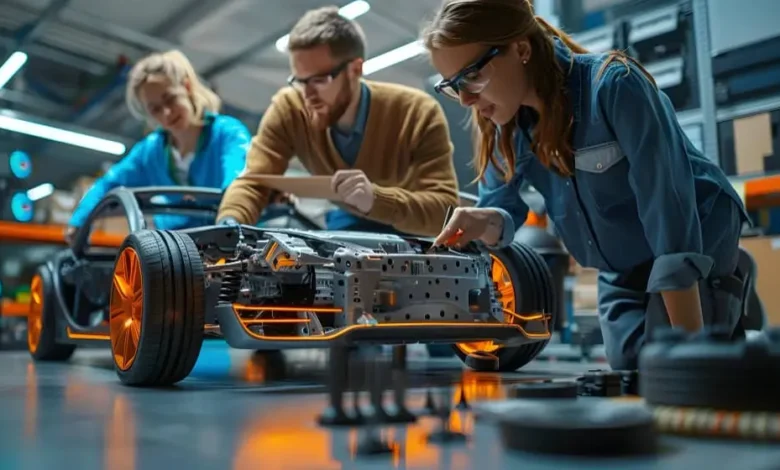Best Schools for Automotive Mechanics and Engineering
Discover the best schools for automotive mechanics and engineering in the U.S., explore career opportunities, salary insights, and frequently asked questions for 2024.

Best Schools for Automotive Mechanics and Engineering. Choosing the right education in automotive mechanics or engineering is crucial to kickstarting a successful career in the automotive industry.
This article covers everything you need to know about schools for automotive mechanics and automotive engineering schools in the United States, providing a detailed look into the best institutions, courses, salary prospects, and career opportunities.
With a growing demand for skilled professionals, this guide will help you navigate through your options in 2025.
1. Introduction to Automotive Mechanics and Engineering
The automotive industry is undergoing a transformation driven by advancements in technology, electric vehicles, and autonomous driving.
As a result, there is an increasing demand for professionals who are skilled in automotive mechanics and engineering.
Whether you want to diagnose and repair cars as an automotive mechanic or design the next generation of vehicles as an automotive engineer, education is key.
What Are Automotive Mechanics and Engineers?
- Automotive mechanics focus on vehicle maintenance, repair, and diagnostics. They are trained to work on a variety of systems, from engines and transmissions to electrical and air conditioning systems.
- Automotive engineers, on the other hand, work on designing, developing, and testing new vehicles or vehicle components. Their work involves understanding complex engineering principles, materials science, and advanced technologies like electric and autonomous vehicles.
2. Where to Find Schools for Automotive Mechanics and Engineering
When searching for schools for automotive mechanics or automotive engineering schools, it’s essential to consider factors like location, program accreditation, and the types of degrees or certifications offered.
Schools for automotive mechanics are typically offered at community colleges, technical schools, and trade institutes, while universities typically house automotive engineering programs.
Automotive Mechanic Schools
- Community Colleges: Offer associate degrees and certificate programs in automotive technology.
- Technical Schools: Provide more focused training for automotive technicians, often with hands-on experience.
- Online Programs: Some schools offer online coursework, but automotive mechanics generally require hands-on training, which is done on-campus or through an apprenticeship.
Automotive Engineering Schools
- Universities: Offer bachelor’s, master’s, and Ph.D. programs in automotive engineering, typically under the umbrella of mechanical engineering programs with automotive specializations.
- Specialized Institutes: Some schools focus exclusively on engineering and technology, providing cutting-edge research opportunities in automotive engineering.
Search phrases like “automotive classes near me” and “automotive technician training near me” are good ways to find local programs.
3. Top Automotive Engineering Schools in the U.S.
If you’re aiming for a career in automotive engineering, attending a top university with a solid program is crucial. Here are some of the best automotive engineering schools in the U.S.:
1. University of Michigan – Ann Arbor
- Degree Offered: Bachelor’s, Master’s, and Ph.D. in Automotive Engineering.
- Highlights: One of the top-ranked programs in the world, with close ties to the automotive industry and cutting-edge research in electric vehicles and autonomous driving.
2. Purdue University – West Lafayette
- Degree Offered: Bachelor’s in Automotive Engineering.
- Highlights: A strong focus on mechanical engineering with a specialization in automotive, featuring hands-on labs and industry partnerships.
3. Stanford University
- Degree Offered: Master’s and Ph.D. in Mechanical Engineering with Automotive Specialization.
- Highlights: Known for its research in autonomous driving technology and proximity to Silicon Valley’s tech innovation hub.
4. Georgia Institute of Technology
- Degree Offered: Bachelor’s and Master’s in Mechanical Engineering with an Automotive Track.
- Highlights: A focus on sustainability and innovation in automotive technologies, with opportunities for industry collaborations.
5. Clemson University
- Degree Offered: Bachelor’s and Master’s in Automotive Engineering.
- Highlights: Home to the CU-ICAR (Clemson University International Center for Automotive Research), which partners with major automotive companies for advanced research.
4. Best Schools for Automotive Mechanics
If you want to become an automotive mechanic, several schools across the U.S. offer top-notch programs in automotive technology degrees and automotive technician training. Here are some of the best options:
1. Universal Technical Institute (UTI)
- Locations: Multiple campuses across the U.S.
- Programs: Automotive, Diesel, Collision Repair.
- Highlights: Extensive hands-on training and partnerships with major automotive brands like Ford, GM, and BMW.
2. Lincoln Tech
- Locations: 15 campuses nationwide.
- Programs: Automotive Technology, Diesel Technology.
- Highlights: Hands-on experience with modern vehicles, including hybrid and electric cars, with strong job placement rates.
3. Ohio Technical College (OTC)
- Location: Cleveland, Ohio.
- Programs: Automotive Technology, High-Performance Technology.
- Highlights: Advanced training with a focus on performance tuning and specialized automotive careers.
4. Penn Foster College
- Location: Online with optional hands-on components.
- Programs: Automotive Repair Technician Certificate.
- Highlights: Flexibility for working students, self-paced online courses.
5. WyoTech
- Location: Laramie, Wyoming.
- Programs: Automotive Technology, Diesel Technology.
- Highlights: Fast-paced, hands-on training, with small class sizes and individualized attention.
5. Automotive Technology Degrees and Courses
An automotive technology degree is the starting point for many mechanics. These programs provide students with the technical knowledge and hands-on skills needed to diagnose, repair, and maintain vehicles. Here’s a breakdown of the common degrees and courses:
Degree Options:
- Associate Degree in Automotive Technology
- A two-year program that covers vehicle systems, diagnostics, and repair techniques.
- Often prepares students for ASE (Automotive Service Excellence) certifications.
- Certificate Programs
- Shorter, focused programs (6-12 months) that cover specific skills like engine repair, electrical systems, or diagnostics.
Common Courses:
- Engine Repair
- Brake Systems
- Suspension and Steering
- Electrical Systems
- Diagnostics and Computer Systems
- Automotive HVAC Systems
Sample Curriculum for an Associate Degree
| Semester | Key Courses |
|---|---|
| 1 | Introduction to Automotive Technology, Electrical Systems |
| 2 | Engine Repair, Brake Systems, Suspension and Steering |
| 3 | Automotive HVAC, Transmission Systems |
| 4 | Diagnostics, Capstone Project |
6. Career Outlook and Salary for Automotive Mechanics and Engineers
Both automotive mechanics and engineers have promising career opportunities, with a growing demand for skilled professionals due to advancements in automotive technology, including electric vehicles (EVs), hybrids, and autonomous cars.
Automotive Mechanic Salary
The salary for automotive mechanics varies depending on location, certifications, and experience:
- Entry-Level Salary: $30,000 – $40,000 annually.
- Average Salary: $45,000 – $55,000 per year.
- Top Salary: $70,000 or more, especially for those specializing in high-performance or hybrid/electric vehicles.
Automotive Engineer Salary
Automotive engineers, who often require more advanced education, tend to have higher earning potential:
- Entry-Level Salary: $65,000 – $75,000 annually.
- Average Salary: $85,000 – $95,000 per year.
- Top Salary: Over $120,000, particularly in automotive design and development or in management positions.
Employment Growth and Job Outlook
- Automotive Mechanics: The U.S. Bureau of Labor Statistics projects steady growth for automotive mechanics, particularly for those trained in hybrid and electric vehicle technology. Job opportunities are strongest in urban areas where vehicle ownership is high, and in states like California and Texas where automotive technology is advancing rapidly.
- Automotive Engineers: As electric and autonomous vehicles gain traction, the demand for skilled automotive engineers is expected to grow. Engineers specializing in sustainability, battery technology, and vehicle safety will be in high demand.
7. Career Opportunities in Automotive Mechanics and Engineering
There are a variety of career paths available to individuals with an automotive mechanics or engineering background. Below are some common job roles and career trajectories:
For Automotive Mechanics:
- General Automotive Technician: Diagnose and repair a wide range of vehicle issues.
- Service Advisor: Work as an intermediary between the mechanic and customer, explaining repairs and costs.
- Specialist Technician: Focus on a specific area like brakes, transmissions, or air conditioning.
- Hybrid/Electric Vehicle Technician: Work specifically with the growing number of hybrid and electric vehicles, a highly specialized field with increasing demand.
- Shop Owner or Manager: With experience, many mechanics go on to manage or own their own shops.
For Automotive Engineers:
- Automotive Design Engineer: Design new vehicles or improve existing designs with a focus on safety, efficiency, and aesthetics.
- Product Development Engineer: Work on developing new automotive technologies, from electric drivetrains to autonomous systems.
- Safety Engineer: Focus on ensuring that vehicles meet safety regulations and perform well in crash tests.
- Sustainability Engineer: Work on reducing the environmental impact of vehicles, from emissions to recycling.
- Project Manager: Oversee entire projects within automotive companies, managing teams of engineers and designers.
Future Opportunities
As the automotive industry continues to shift towards electric vehicles (EVs), autonomous driving, and sustainability, job opportunities will expand for professionals who specialize in these areas.
Engineers who focus on battery technology, electric drivetrains, and vehicle connectivity are expected to see a growing demand in the coming years.
8. State-by-State Guide to Automotive Schools and Programs
Automotive programs vary by state, with some regions offering more robust programs due to their proximity to the automotive industry or major urban areas. Here’s a quick look at automotive education across key states:
California
- Top Schools: Universal Technical Institute (UTI), University of California-Berkeley (for engineering).
- Key Focus: Hybrid and electric vehicles, environmental sustainability.
Michigan
- Top Schools: Wayne State University, University of Michigan.
- Key Focus: Automotive engineering, proximity to Detroit and major automakers.
Texas
- Top Schools: Lincoln Tech, Texas A&M University (for engineering).
- Key Focus: Diesel technology, growing EV infrastructure.
Florida
- Top Schools: Florida Institute of Technology, Miami Dade College.
- Key Focus: Automotive technology, service technician training.
New York
- Top Schools: Rochester Institute of Technology, CUNY.
- Key Focus: Automotive engineering, with a focus on innovation and design.
9. FAQs About Schools for Automotive Mechanics
Q: What is the difference between automotive mechanics and automotive engineering?
A: Automotive mechanics focus on vehicle diagnostics, repairs, and maintenance. Automotive engineers design, develop, and test new vehicles and technologies.
Q: How long does it take to complete automotive technician training?
A: Automotive technician training typically takes 6 months to 2 years, depending on whether you pursue a certificate or an associate degree.
Q: What are the highest-paying jobs for automotive mechanics?
A: Specializing in areas like hybrid/electric vehicles or working in luxury car repair can lead to higher salaries. Management roles, like service managers or shop owners, also tend to pay more.
Q: Are automotive engineering schools different from mechanical engineering schools?
A: Automotive engineering is often a specialization within a broader mechanical engineering program. Some schools offer dedicated automotive engineering degrees, while others provide tracks or concentrations in automotive topics.
Q: Can I study automotive technology online?
A: Some schools offer online automotive technology programs for theoretical coursework, but hands-on training is essential, which usually requires in-person attendance.
Q: How do I become a certified automotive technician?
A: Completing an accredited training program and passing ASE (Automotive Service Excellence) exams can lead to certification. Most employers prefer ASE-certified technicians.
Q: How much can an automotive engineer earn in the U.S.?
A: The average salary for an automotive engineer is around $85,000 per year, with potential earnings exceeding $120,000 in specialized fields or management positions.
10. Conclusion
Choosing the right school for automotive mechanics or automotive engineering is the first step toward a rewarding career in the automotive industry.
With increasing demand for skilled professionals due to advancements in electric vehicles, autonomous technology, and sustainability, there has never been a better time to pursue an education in this field.
By attending one of the best automotive technology degree programs or automotive engineering schools in the U.S., you’ll be well-positioned to take advantage of the growing opportunities in this dynamic and evolving industry.





